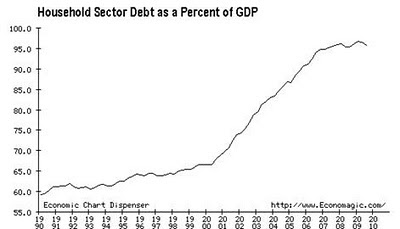Hussman Weekly Market Comment: Notes on a Difficult Employment Outlook
Aside from the shorter-term suspicion that unemployment has not peaked, I want to be clear that my main concern about the employment situation is with servicing debt, not providing for the basic needs of the population. I'm certainly not talking about Malthusian macroeconomic shortages or an inability for our nation to support itself. It is the gap between cash flows and household debt service that strikes me as problematic.

On the broader issue of supporting a growing population, it has historically been true (and is likely to continue to be true even in the event of further credit strains) that the needs of the U.S. population can be supported through productivity growth and to some extent by importing the output produced by cheaper foreign labor. In the long run, productive investment is the cornerstone of economic stability. Over the past decade we have greatly threatened that that stability through the ridiculous misallocation of resources in speculative bubbles and unproductive "investments," but I am convinced that we will re-learn, painfully or otherwise, to better allocate our resources. My impression continues to be that the current deleveraging cycle will likely be a multi-year process that is presently far from complete.
Foreign trade can also be the source of mutual economic benefit, but only if it ultimately improves the allocation of resources. On our current path, we have instead relied on cheap imports from China and other countries while at the same time destroying our own capital through poorly allocated speculative investments, followed by bailouts to the lenders who provided that capital. The only plausible outcome of that dynamic is that foreigners will gradually acquire claims on our nation (Treasury debt or private securities), and with them, the ability to acquire our productive assets. No doubt many analysts on the financial channels will gurgle with excitement every time a foreign acquirer bids for ownership of a U.S. company, but this is how we will pay for our the difference between our consumption and our income. Again though, I am convinced that we will ultimately re-learn to better allocate our resources.
- How Do You Say “minsky” In Mandarin? - By Christopher Pavese
Wikipedia defines a Minsky Moment as, “a sudden major collapse of asset values which is part of the credit cycle or business cycle. Such moments occur because long periods of prosperity and increasing value of investments lead to increasing speculation...
- Stan Druckenmiller On China
Found via ValueWalk. Stan Druckenmiller: The growth in credit at a time when GDP growth is slowing is a problem for China. And I think this is the 2009-11 stimulus coming back to bite. I understand that it had to be done to fund entrepreneurs and the...
- Hussman Weekly Market Comment: Two One-way Lanes On The Road To Ruin
Let's go back to the last line in Schumpeter's remark. Only when the lending ultimately results in a surplus of productive activity is the loan successful. Only then "has the bank done good business - then and only then however, is there also...
- Hussman Weekly Market Comment: Greek Debt And Backward Induction
Thursday was a fascinating day in the market, featuring a 20-minute span in which the Dow moved from a loss of about 300 points to a loss of nearly 1000 points and then back again within a span of about 15-20 minutes. While the decline and recovery was...
- Hussman Weekly Market Comment: Extend And Pretend
Regardless of whether the U.S. banking system would not presently be able to meet its liabilities with its assets, there is another question: assuming that banks are allowed to extend and pretend for a long enough period of time, will they ultimately...

